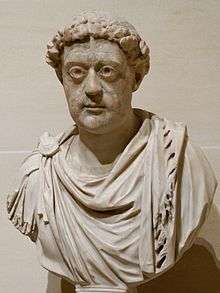457
This article is about the year 457. For the number, see 457 (number). For other uses, see 457 (disambiguation).
| Millennium: | 1st millennium |
|---|---|
| Centuries: | 4th century – 5th century – 6th century |
| Decades: | 420s 430s 440s – 450s – 460s 470s 480s |
| Years: | 454 455 456 – 457 – 458 459 460 |
| 457 by topic | |
| Politics | |
| State leaders – Sovereign states | |
| Birth and death categories | |
| Births – Deaths | |
| Establishment and disestablishment categories | |
| Establishments – Disestablishments | |
| Gregorian calendar | 457 CDLVII |
| Ab urbe condita | 1210 |
| Assyrian calendar | 5207 |
| Bengali calendar | −136 |
| Berber calendar | 1407 |
| Buddhist calendar | 1001 |
| Burmese calendar | −181 |
| Byzantine calendar | 5965–5966 |
| Chinese calendar | 丙申年 (Fire Monkey) 3153 or 3093 — to — 丁酉年 (Fire Rooster) 3154 or 3094 |
| Coptic calendar | 173–174 |
| Discordian calendar | 1623 |
| Ethiopian calendar | 449–450 |
| Hebrew calendar | 4217–4218 |
| Hindu calendars | |
| - Vikram Samvat | 513–514 |
| - Shaka Samvat | 379–380 |
| - Kali Yuga | 3558–3559 |
| Holocene calendar | 10457 |
| Iranian calendar | 165 BP – 164 BP |
| Islamic calendar | 170 BH – 169 BH |
| Julian calendar | 457 CDLVII |
| Korean calendar | 2790 |
| Minguo calendar | 1455 before ROC 民前1455年 |
| Seleucid era | 768/769 AG |
| Thai solar calendar | 999–1000 |

Emperor Leo I (457–474)
Year 457 (CDLVII) was a common year starting on Tuesday (link will display the full calendar) of the Julian calendar. At the time, it was known as the Year of the Consulship of Constantinus and Rufus (or, less frequently, year 1210 Ab urbe condita). The denomination 457 for this year has been used since the early medieval period, when the Anno Domini calendar era became the prevalent method in Europe for naming years.
Events
By place
Roman Empire
- January 27 – Emperor Marcian dies at Constantinople, possibly of foot gangrene, an infection contracted during a long religious journey. He is buried in the Church of the Holy Apostles together with his late wife Pulcheria.
- February 7 – Leo I, a Thraco-Roman (or Dacian) high-ranking officer, becomes the new emperor of the Eastern Roman Empire, reigning for nearly 20 years. He is first to accept the Byzantine crown from the hands of the patriarch of Constantinople.
- April 1 – Majorian is acclaimed emperor by the Roman army after defeating 900 Alemanni near Lake Maggiore (Italy).
- December 28 – Majorian is crowned emperor of the Western Roman Empire and recognized by pope Leo I. His rule is accepted in Italy, Dalmatia and some territories in Northern Gaul.
Europe
- Childeric I succeeds his father Merovech as king of the Salian Franks. He establishes his capital at Tournai (modern Belgium) and becomes a foederatus (pl. foederati) of the Western Roman Empire.
- According to the Anglo-Saxon Chronicle, 4,000 Britons are slain at Crecganford in battle against Hengist and his son Oisc of Kent.
Persia
- Yazdegerd II dies after a 19-year reign. He is succeeded by his son Hormizd III who seizes the Persian throne. His elder brother Peroz I rebels against him in Sistan (Iran). After months of civil war he defeats Hormizd and becomes the seventeenth Sasanian king of the Persian Empire.
By topic
Religion
- Victorius of Aquitaine computes new tables for celebrating Easter.
Births
- Leontia, Roman empress and wife of Anthemius (d. 479)
- Medardus, bishop of Vermandois (approximate date)
Deaths
- Avitus, emperor of the Western Roman Empire
- January 27 – Flavius Marcian, Roman emperor (b. 392)
- October 28 – Ibas, bishop of Edessa (modern Turkey)
- Merovech, king of the Salian Franks (approximate date)
- Palladius, first bishop of Ireland (approximate date)
- Saint Proterius, Patriarch of Alexandria
- Theodoret of Cyrrhus, bishop and theologian
- Valerian of Abbenza, bishop and saint (b. 377)
- Yazdegerd II, king of the Persian Empire
References
This article is issued from Wikipedia - version of the Saturday, February 07, 2015. The text is available under the Creative Commons Attribution/Share Alike but additional terms may apply for the media files.